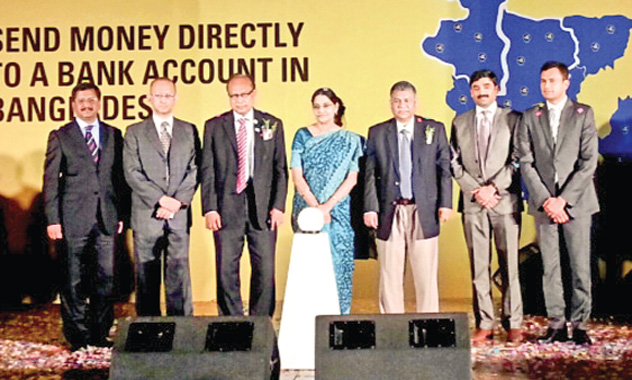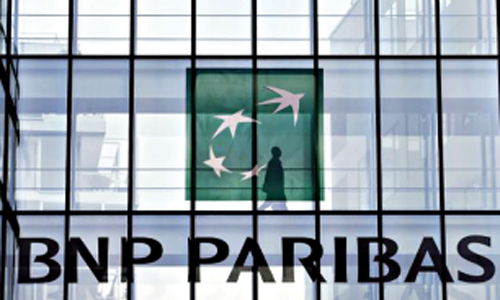Banking
WU, Bank Asia Launch D2B NRBs can send money directly thru banks

Western Union Company, a leader in money transfer and global payment service, and Bank Asia, one of the leading banks in Bangladesh introduced Western Union’s Direct-to-Bank (D2B) money transfer service for the first time in Bangladesh.
The new service will allow Bangladeshi expatriates send money to their family members in Bangladesh at any bank account connected to BEFTN (Bangladesh Electronic Funds Transfer Network) from any of Western Union’s participating agent locations across the world.
The service is currently available from Malaysia as a first step and will soon be offered from other countries across the globe, said a press release.
The service was launched at a function in Dhaka recently. Kiran Shetty, Western Union’s Regional Vice President for South Asia, and Md. Mehmood Husain, President and Managing Director of Bank Asia Ltd, were present.
“According to the Bangladesh Bank, remittances sent by Bangladeshis living and working abroad surpassed $14.4 billion during the period August 2012 - July 2013, and represent 10 percent of the country's GDP,” said Western Union’s Regional Vice President for South Asia, Kiran Shetty.
“In such a vibrant country, we at Western Union believe that our task is to extend our services to as many consumers and provide them with more choices in moving money in a reliable and convenient manner. The cooperation between Western Union and Bank Asia will help Non-Resident Bangladeshis send money directly to bank accounts in Bangladesh, facilitating greater access to financial services. We are very happy to join hands with Bank Asia and offer this new service D2B” Shetty continued.
Inflation to remain stable: BB governor
The Bangladesh Bank governor Dr Atiur Rahman on Friday hoped that the country’s inflation rate is like to remain stable as the central bank has an effective monetary policy in place. The current inflation rate is lower than 7 per cent and the central bank dose not foresee any recent rise in inflation, the governor also said while addressing a post budget press conference at Osmani Milonayoton Auditorium in Dhaka. When asked about the government’s plan to borrow Tk 31,121 crore from banks to meet the budget deficit the governor said inflation will not increase because the central bank has enough preparation to face any uncertain situation. The central bank has taken some effective measures to keep the inflation stable. Specially SME, agriculture, and sharecropper’s loan progr-ammes to reduce poverty is helping to keep inflation within the desired limit. He added.
News:The Independent/7-June-2014Euro dips in Asia after ECB easing measures
he euro dipped a touch in Asia on Friday after the European Central Bank launched unprecedented easing measures to bolster fragile eurozone growth and prevent deflation.
The single currency fetched $1.3657 in Tokyo afternoon trade, down from $1.3662 in New York but still up from $1.3600 in Tokyo earlier Thursday.
The euro weakened to 139.76 yen from 139.93 yen, but was also stronger than 139.43 yen in Tokyo prior to the announcement.
The dollar edged down to 102.33 yen from 102.41 yen.
The ECB said after a meeting Thursday it would cut its deposit rate to negative territory. This means banks will be charged for leaving funds at the ECB in the hope they might lend it on to businesses and consumers instead.
It also slashed its lending rate to a record low of 0.15 per cent from 0.25 per cent and said hundreds of billions of euros would be made available in cheap loans to banks as long as they lent more to the private sector.
Bank chief Mario Draghi said after the meeting that policymakers would also be open to possible asset purchases, or quantitative easing, similar to that undertaken in the United States and Japan.
‘The ECB managed to surprise relative to high expectations by delivering a full package of easing measures,’ Credit Agricole said.
‘Any further deterioration in the inflation outlook would likely trigger outright asset purchases.’
The dollar was lower against other Asia-Pacific currencies.
It weakened to 1,019.75 South Korean won from 1,021.48 won, to 43.66 Philippine pesos from 43.82 pesos, to Sg$1.2527 from Sg$1.2573, and to 59.22 Indian rupees from 59.34 rupees.
The US unit also weakened to 11,839 Indonesian rupiah from 11,889 rupiah, to 32.56 Thai baht from 32.68 baht, and to Tw$30.02 against Tw$30.03.
The Australian dollar rose to 93.28 US cents from 92.83 cents while the Chinese yuan was at 16.34 yen against 16.39 yen.
As bank fines soar, US threatens $16b BNP penalty
 An employee walks behind the logo of BNP Paribas in a company’s building in Issy-les-Moulineaux, near Paris recently
An employee walks behind the logo of BNP Paribas in a company’s building in Issy-les-Moulineaux, near Paris recently
US authorities negotiating with BNP Paribas over alleged sanctions violations at one point suggested that France’s biggest bank pay a penalty as high as $16 billion, according to people familiar with the matter.While the sources said that number was only proposed as a negotiating tactic in response to an offer from BNP of about $1 billion, the dollar figures being thrown around demonstrate what bankers and their allies say is an alarming trend of ever-increasing record penalties.A $16 billion settlement would have pushed BNP’s penalty above the biggest ever for a bank — JPMorgan Chase & Co, which paid $13 billion last year to resolve a number of civil mortgage-related allegations.More recently, authorities have been discussing a settlement with BNP in the range of $10 billion, sources have said. US authorities are probing whether BNP evaded US sanctions relating primarily to Sudan between 2002 and 2009, and whether it stripped out identifying information from wire transfers so they could pass through the US financial system without raising red flags.The New York State Department of Financial Services, one of the five offices negotiating the settlement with BNP, could receive at least $2 billion of an eventual $10 billion deal, according to a source familiar with the matter. That would be more than three times that office’s $552 million annual budget this year.A $10 billion fine would almost wipe out BNP’s entire 2013 pretax income of about 8.2 billion euros ($11.2 billion). BNP reserved $1.1 billion against a potential fine.Representatives of the Justice Department and BNP declined to comment on the negotiations.In the past two years the US Justice Department has said it’s broken records on penalties for corporate misconduct at least seven times, including three times this year alone. The most recent was Credit Suisse in May, which paid $2.6 billion over charges that it helped American evade US taxes, the largest penalty ever levied in a criminal tax case.Total corporate criminal penalties in the United States overall increased about 647 per cent between 2001 and 2012 to about $4.3 billion, according to figures compiled by University of Virginia law school professor Brandon Garrett.The robust growth in corporate penalties, especially for banks, has defence lawyers questioning how authorities calculate each landmark settlement and how institutions can prepare for such fines they might face.Banks are also deploying strategies to try to keep the numbers from growing, including enlisting top executives in settlement negotiations and taking their chances going to trial.‘I think everyone realizes that it’s an exuberant market,’ said one defence lawyer who has negotiated recent settlements with the Justice Department and declined to be named.There are multiple explanations for the rising fines. For one, cases related to the 2007-2009 financial crisis have produced big settlements connected to trillions of dollars in subprime mortgage financial products. US authorities have also turned their attention to other crimes involving big dollar amounts, including money laundering, sanctions violations and the rigging of benchmark interest rates.The Justice Department may also be responding to political pressure, especially because no high-profile bankers have gone to jail for the role they played in fuelling the financial crisis.
News:New Age/7-June-2014IFIC Bank signs deal with Mars Stitch on m-banking payment

IFIC Bank Limited signed an agreement with Mars Stitch Limited to provide IFIC mobile banking services to the employees of the company.
As per the agreement, the bank will facilitate the Mars Stitch Limited in disbursing the salaries and other payments of its employees through IFIC mobile banking services, said a press release.
Shah A Sarwar, Managing Director and CEO of IFIC Bank Limited and Md Arif Mahmud, Managing Director of Mars Stitch Limited signed the agreement at the bank’s Gulshan office in Dhaka recently.
Aziz Ahamed Bhuiyan, Chairman of Mars Stitch Limited, Monirul Islam, Director, Md Nurul Hasnat, Relationship Manager of Gulshan Branch, Ashim Chowdhury, Head of Business Project Delivery, Ferdousi Begum, Head of Retail Banking, Mohammad Monirul Islam, Head, Mobile Banking Division, and Tasnuva Tarek, Head of Business of Mobile Banking Division of IFIC Bank attended the signing ceremony.



